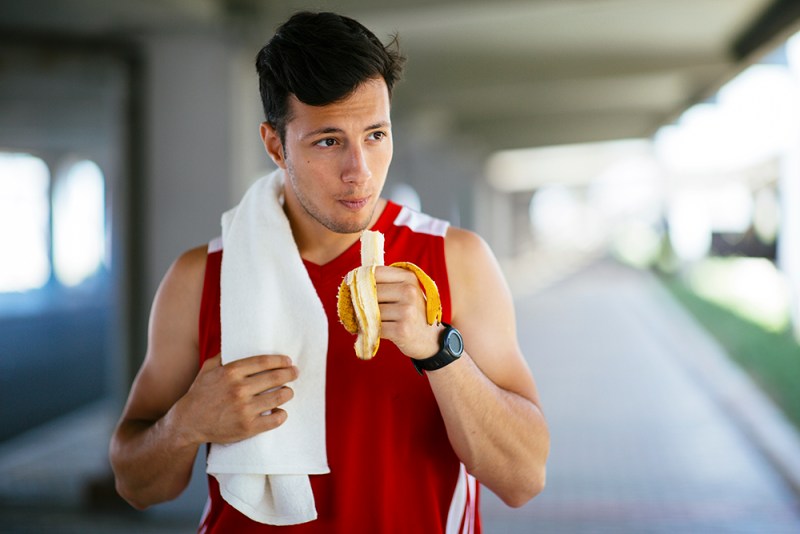
Runners know that in order to have your best workout, you have to be properly fueled. Running is a metabolically demanding form of exercise, particularly if you’re doing a long run or a hard interval workout.
Failing to eat the right foods before your run can make or break how you feel on the run and how your body performs. If you don’t eat enough, or if you eat the wrong types of food, you may not have enough energy to push your body. You might “hit the wall” or “run out of gas.” If you eat too much (or, again, the wrong types of foods), you may find yourself running for the nearest bathroom, bloated, nauseated, doubling over with side stitches, or feeling sluggish.
Not sure what to eat before a run or before your race? Keep reading for a list of the best pre-race foods and pre-workout meals and snacks to fuel a good run.
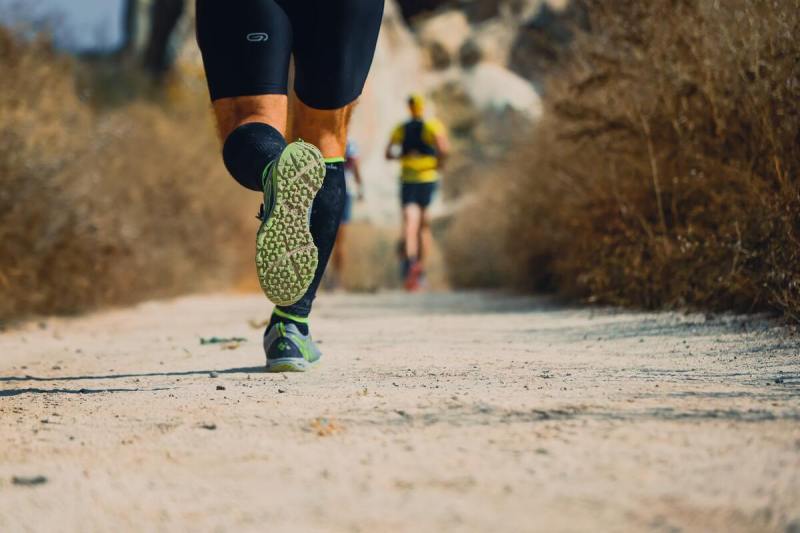
Should you ever run on an empty stomach?
Fasted cardio has commonly been associated with improved endurance and weight loss, although more research needs to be done on the benefits. However, if you are going for a shorter run, such as a couple of miles or less, then you will likely be fine with running on an empty stomach.
If you are running for any longer than that, it is recommended that you plan on having a healthy and energizing snack or meal beforehand. This will help prevent you from getting tired too quickly and make your exercise session more enjoyable.
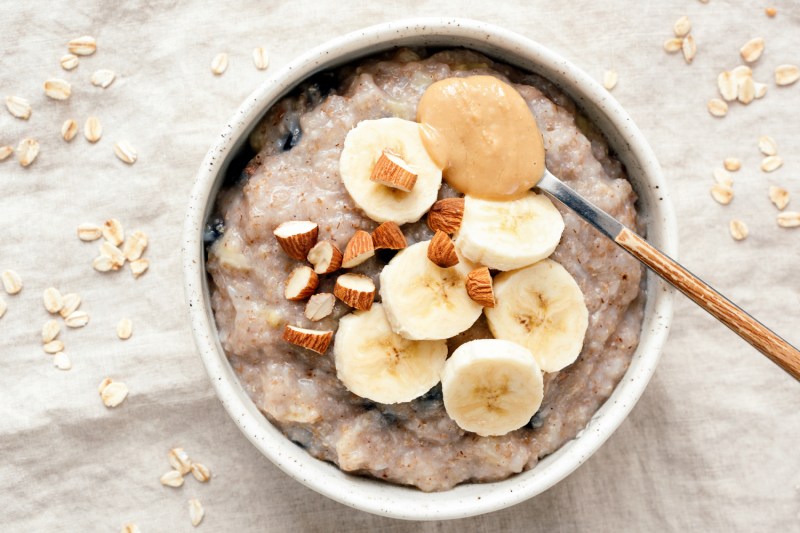
What to eat the morning of a race or run
Many runners ask, “What should I eat before a race, long run, or hard workout?”
Ultimately, what and how much you should eat before a race or a run depends on how long your race or intended workout is. The longer the race, the more you will need to eat. It’s also highly important that the ratio of the macronutrients you eat in your pre-race meal or snack is heavily weighted towards carbohydrates.
If you’re just running a 5k, depending on the sensitivity of your stomach, the time of the race, your body size, and your running pace, you may need a light snack, such as a banana with a tablespoon of nut butter, a small bowl of oatmeal, an energy bar, dried fruit, or even just a sports drink. Some runners prefer a more filling meal, but in terms of your body’s physiological energy needs, you can typically get away with consuming just 200 to 500 calories of predominantly carbohydrate-based foods to top off your muscle glycogen stores.
Once you step up to the 10k, or if you’ll be running for an hour or more, the pre-race fueling becomes even more important. Good pre-race breakfasts before longer races and runs should still be high in carbohydrates, but they should also contain some protein and fat to help you feel fuller. You will also need more calories, so the pre-race meal should be larger. You should also consider having a snack as race time draws near.
You want to make sure that the timing of your pre-run meals or snacks gives your body ample time to digest your meal so that you don’t end up experiencing cramps. When you exercise, blood is diverted away from the digestive tract to meet the high-oxygen demands of the working muscles. This causes a relative cessation of digestion, so any food left in your stomach or intestines will essentially sit around until you stop running and blood flow to the GI tract resumes.
Although every individual is different, here are some good guidelines for how long to wait after eating before running:
- Wait 3–4 hours after a large meal to run.
- Wait 2–3 hours after a small meal to run.
- Wait 1–2 hours after a snack to run.
- Wait 30 minutes after an energy gel or quick bite to run.
For longer races, some good pre-race breakfasts include:
- Oatmeal or overnight oats with berries and nuts
- A fruit and veggie smoothie with protein powder
- A bagel or whole-grain bread with nut butter and banana
- Muesli
- Whole-grain waffles
- Low-sugar cereal with nuts and fruit
For the pre-race snack 30 to 90 minutes before the gun goes off, focus on eating simple carbohydrates like:
- Energy gels
- Granola bars
- Fresh or dried fruit
- Applesauce
- Rice cakes or crackers
- Animal crackers
- Sports drinks
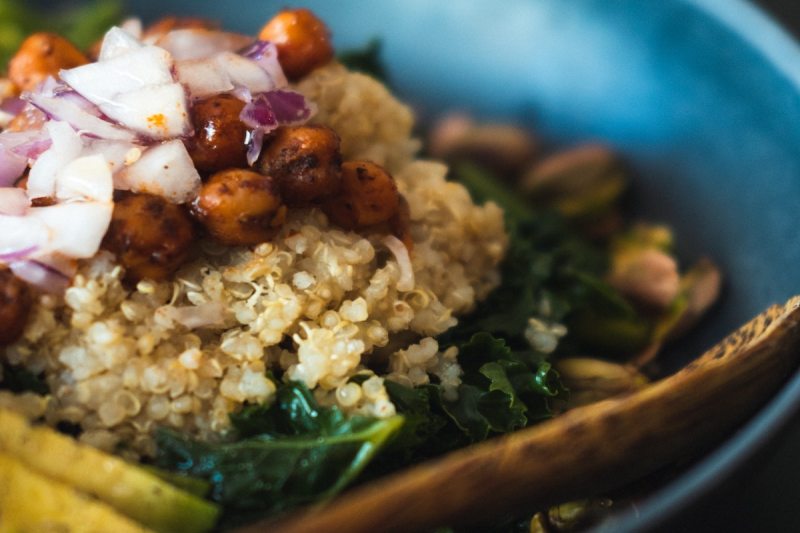
What to eat the night before a race or long run
The same factors that affect what foods to eat and how much of those foods to eat the morning before running a race or hard workout apply to what to eat the night before a race. For all race distances and key workouts on your training schedule, you should always eat food that your body is familiar with and that you know digest well. This applies to the pre-race morning breakfast as well. Introducing new foods is never a good idea in the 24 to 48 hours before a race. You never know what will throw your digestive system off.
For shorter events like a 5k, there’s really no need for special dietary adjustments the night before the race. Just eat a well-balanced meal with foods that agree with you.
For longer races and runs, particularly for the half-marathon and beyond, some amount of carb-loading the night before the event can potentially be beneficial. Focus on eating nutritious complex carbohydrates like whole grains (quinoa, brown rice, buckwheat, or whole wheat pasta, if you are not sensitive to gluten) and starchy vegetables like sweet potatoes or regular potatoes. Although legumes such as chickpeas, lentils, and other beans are normally healthy foods to include in a well-rounded diet, it’s typically best to avoid these foods the night before a race because the high-fiber content can cause digestive distress while running.
The rest of your meal should be balanced with protein and healthy fats. An example of a good pre-race dinner the night before a longer race or important workout is salmon over quinoa with asparagus and slivered almonds, along with a large sweet potato with coconut butter. A vegan runner might have brown rice stir fry with tofu, edamame, sesame seeds, green beans, peppers, onions, and mushrooms. Drink plenty of water as well.
The goal should be to feel satisfied without feeling overstuffed.
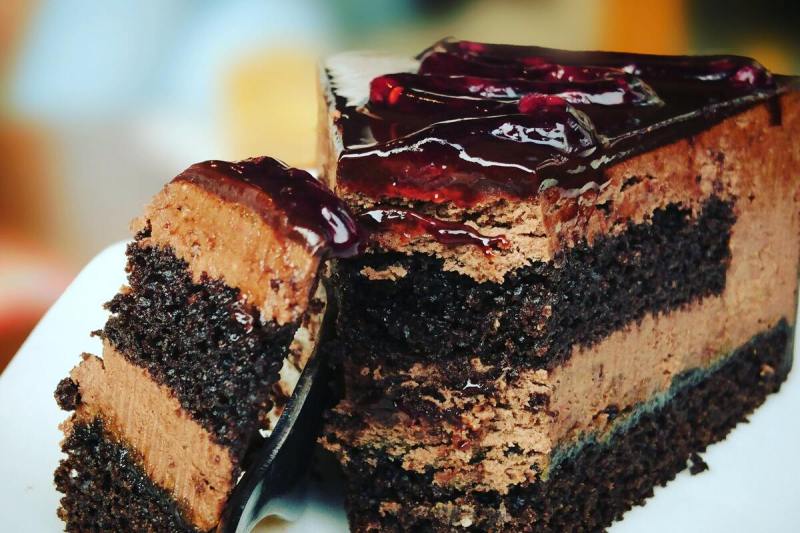
Foods you shouldn’t eat before running
As much as eating the “right” foods before running can make a difference in how well you run, eating the “wrong” foods can certainly decrease your performance and leave you feeling far from your best.
There are a few types of foods and drinks you should avoid consuming before running.
High-fiber foods
Although consuming enough fiber is generally an important aspect of optimal nutrition for health, fiber can slow digestion and cause gas and bloating because it draws water into the intestines and bulks up stool, which slows gastric emptying.
Avoid legumes such as beans, peas, lentils, and chickpeas, and any type of high-fiber cereal or high-fiber vegetable.
Processed foods and excess simple sugars
Processed foods and foods high in simple sugars tend to be high-glycemic foods, meaning they can cause a rapid rise in blood sugar and then a compensatory drop. Although simple carbohydrates are optimal in the 30 to 60 minutes before running, if you’re going to be eating a pre-race meal or snack outside of that window, focus on complex carbohydrates.
Fatty foods
Fat delays gastric emptying because it takes much longer to digest, so it’s typically not good to eat fatty foods before running unless you have numerous hours before you begin. Avoid fried foods, excess butter and cream, ice cream, processed snack cakes or baked goods, etc.
Alcohol, soda, and milk
What you drink before running can also affect how your body feels and performs. Alcohol, soda, and milk should all be avoided, though milk might be okay if you don’t have trouble processing lactose.
Overall, the best foods to eat before running are those that work best for you. All runners have their own unique biochemistry and digestive systems, so experiment with different options and see what works best for you.



